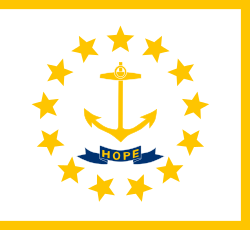Country Party (Rhode Island)
.jpg)
The Country Party, Rhode Island's anti-federalist political party, controlled the Rhode Island General Assembly from 1786 to 1790 and opposed the Federalist Party, which supported the U.S. Constitution. The Federalists were largely from the "town" of Providence, Rhode Island, while the Country Party members were from the surrounding rural areas.
The Country Party opposed the U.S. Constitution largely because of civil liberties concerns (leading to support for the Bill of Rights), distrust of distant government, opposition to slavery in the Constitution, and disagreements about monetary policy, specifically Rhode Island's desire to honor state-issued paper currency as legal tender.
Control of the General Assembly
Rhode Island's movement for state independence lasted long after the passage of the Constitution in 1788. Rhode Island was an early supporter of independence from Great Britain, passing legislation asserting its independence prior to the United States Declaration of Independence, and it was the last of the thirteen colonies to ratify the U.S. Constitution. The Constitution replaced the Articles of Confederation and it created a stronger national government than had existed under the Articles.
Scituate's William West and South Kingstown's Jonathan Hazard were leaders of the rural Country Party which opposed the Constitution. The party "was suspicious of the power and the cost of a government too far removed from the grass-roots level, and so it declined to dispatch delegates to the Philadelphia Convention of 1787, which drafted the United States Constitution. Then, when that document was presented to the states for ratification, Hazard's faction delayed (and nearly prevented) Rhode Island's approval."[1]
Among those in Rhode Island who opposed the Constitution were Quakers, who were opposed to the Constitution largely because of its sanctioning of slavery,[1] and Baptists, one of the largest denominations in Rhode Island, who had historically been persecuted by various governments. Many were also concerned about the government created by the Constitution would violate natural rights and wanted a Bill of Rights to protect individual liberties. In the rural areas of Rhode Island, citizens wanted to ensure that their paper currency was redeemable as legal tender in the future.
William West's protest
William West led nearly 1,000 armed, rural farmers to Providence to protest an ox roast celebration and toast to the Constitution on the 4th of July in 1788 (shortly after the ninth state had ratified it). A compromise between the federalists and anti-federalists was reached, and civil war was averted (the federalists agreed to celebrate only independence and not the adoption of the Constitution). The incident was widely reported in newspapers throughout the thirteen colonies.[2] Resistance to the Constitution, however, remained strong, and Rhode Island was the last of the 13 colonies to ratify the Constitution in 1790.
Passage of the U.S. Constitution
After delaying a constitutional convention eleven times, the legislature finally called for a convention in South Kingstown (specifically, the village of Kingston) in March 1790. After failing to reach a majority, another convention was held in Newport in May 1790 where the Constitution narrowly passed after several antifederalists absented themselves and Governor John Collins decided to support the Constitution, which eventually cost him his office. Rhode Island was the last of the original 13 states to ratify the Constitution in 1790 and ratified it by the narrowest margin of any state, 34 votes to 32. As the United States Constitution went into effect when George Washington was inaugurated as president on April 30, 1789, Rhode Island was, technically speaking, an independent nation for one year until it ratified the Constitution.
Aftermath

In retaliation for Collins's switch to support the Constitution, Rhode Islanders elected an anti-federalist, Arthur Fenner, governor for the next 15 years. After passage of the Constitution, some Country Party leaders such as William West were left bankrupt because the federal government refused to honor the state's paper money as legal tender. Also, largely because of Rhode Island's and North Carolina's concerns for the protection of natural rights, the Bill of Rights was added to the Constitution in 1791.
References
- 1 2 "Chapter 3: The Revolutionary Era, 1763-1790". Rhode Island General Assembly. Retrieved July 7, 2014.
- ↑ Staples, William R. (1843). The Town of Providence, From Its First Settlement, to the Organization of the City Government, in June, 1832. Providence, RI: Knowles and Vose. pp. 332–335. Retrieved July 7, 2014.
